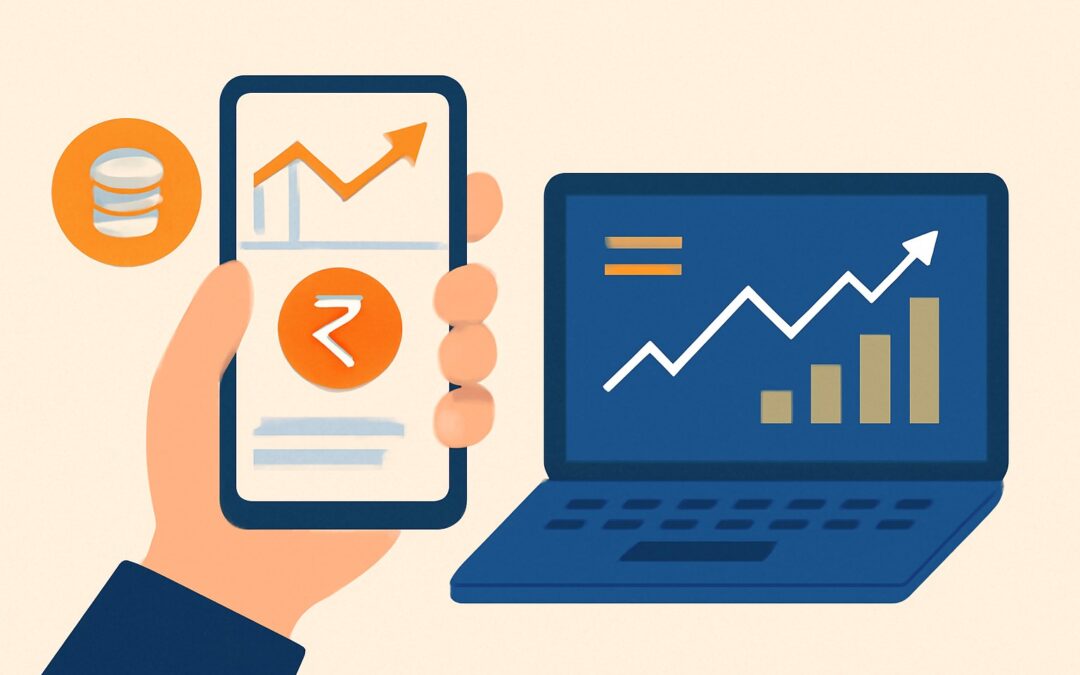In the past decade, technology has revolutionised how individuals invest in the financial markets. From traditional methods of calling brokers to the rise of digital platforms, technology has made investing more accessible and efficient.
At the forefront of this revolution are mutual fund apps and trading apps, which have transformed the way investors interact with the markets. These innovations are not just making investing easier but also changing the entire landscape of wealth management.
The Role of Mutual Fund Apps
Mutual funds have always been an attractive investment option for beginners due to their diversified nature. However, until a few years ago, investing in mutual funds was a cumbersome process, requiring physical paperwork and the intervention of brokers.
With the advent of mutual fund apps, this process has been streamlined. Now, investors can select, invest in, and track their mutual fund investments all from their mobile devices. The rise of mobile technology has democratized access to mutual funds by offering features such as:
- Easy Investment Tracking: Real-time updates on the performance of mutual funds, providing investors with a clear view of their portfolio’s growth.
- Systematic Investment Plans (SIPs): With mutual fund apps, investors can set up SIPs directly from their smartphones, enabling consistent, automated investments.
- Educational Resources: Many apps offer learning tools and detailed explanations of fund options, helping new investors make more informed decisions.
For first-time investors, these apps provide an easy entry point into the world of mutual funds, helping them build diversified portfolios with minimal effort.
Trading Apps: A Shift Towards Real-Time Investing
While mutual fund apps focus on long-term, passive investing, trading apps cater to those who prefer active trading. With the rise of real-time trading platforms, investors can now buy and sell stocks, ETFs, options, and other securities instantly. The technological advancements behind trading apps have led to the rise of retail investors in the market.
Today’s best trading apps offer advanced features that were previously only available to institutional investors. These include:
- Real-Time Data and Charts: Live market data, price alerts, and advanced charting features allow investors to make quick, informed decisions.
- Order Execution in Seconds: With a few taps, traders can place orders, ensuring they don’t miss out on potential market opportunities.
- Advanced Trading Tools: From options trading to algorithmic execution, trading apps are equipped with features that cater to both novice and experienced traders.
These features are making it easier for investors to capitalize on short-term market movements, providing a level of control and efficiency that was once reserved for professional traders.
The Integration of Robo-Advisory
As mobile apps evolve, so do the tools they offer. One of the most significant advancements in technology is the integration of robo-advisors into both mutual fund and trading apps. Robo-advisors use algorithms to manage investment portfolios, providing automated, personalized advice based on an investor’s risk tolerance, financial goals, and time horizon.
Robo-advisory services are particularly appealing to investors who want to automate their investing without paying hefty management fees. For mutual fund investors, robo-advisors can recommend optimal fund allocations based on their risk profile, while trading apps use them to suggest stocks or other securities that align with the investor’s trading strategy.
This blend of automation and personalized advice is helping retail investors make smarter, more data-backed investment decisions.
Technology’s Role in Investor Education
In addition to offering investment opportunities, mutual fund apps and trading apps also serve as powerful educational tools. The integration of market news, expert analyses, and financial calculators makes these platforms indispensable for new investors.
- Market Insights: Investors can access real-time news and market analyses directly on their app, helping them stay updated with the latest trends.
- Educational Content: Many apps provide educational materials, such as articles, video tutorials, and investment courses, to help beginners understand market concepts.
- Risk Management Tools: Apps include calculators for assessing risk, estimating returns, and planning investment strategies, helping users make informed choices.
This shift in focus towards investor education is enabling individuals to take charge of their financial futures. Investors are no longer dependent on financial advisors or brokers but are becoming more self-sufficient in managing their portfolios.
The Future of Mobile Investing
As mobile technology continues to evolve, the future of investing looks brighter than ever. One of the key developments expected is the further integration of AI and machine learning. These technologies will likely play an even bigger role in personalizing investment strategies and offering real-time, actionable advice.
In addition to AI, blockchain technology is gaining traction to enhance security and transparency in the investment space. As more apps adopt blockchain-based solutions, investors can expect greater trust and accountability in their transactions.
Moreover, the increased adoption of biometric authentication and multi-factor security measures will ensure that mobile investing remains safe and secure, especially as retail investment volumes continue to rise.
Conclusion
Technology has fundamentally changed the way people invest, making the process more accessible, transparent, and efficient. From mutual fund apps that simplify long-term investing to trading apps that enable real-time trading, these platforms are reshaping the investment landscape.
With the continuous integration of new technologies, such as robo-advisors, AI, and blockchain, mobile investing is becoming more sophisticated and personalised, empowering a new generation of investors to take control of their financial futures.






